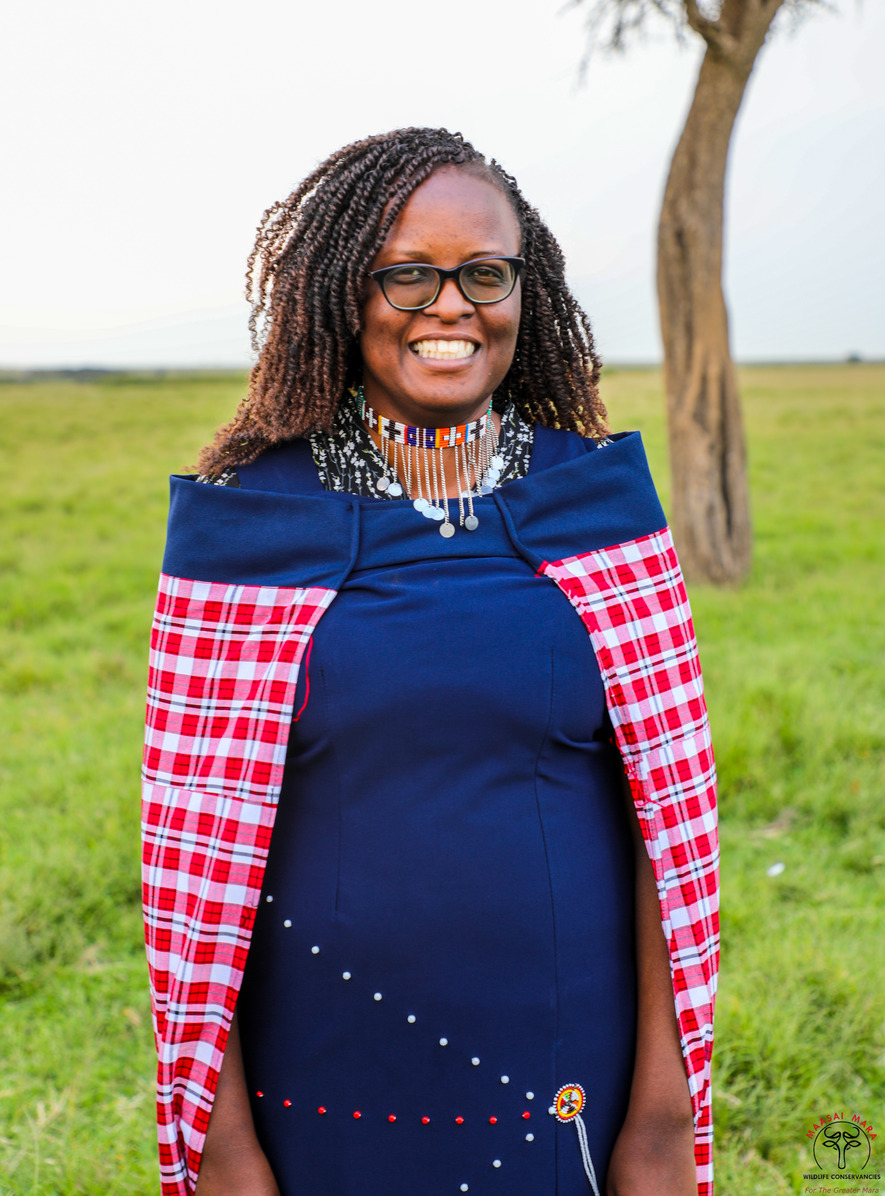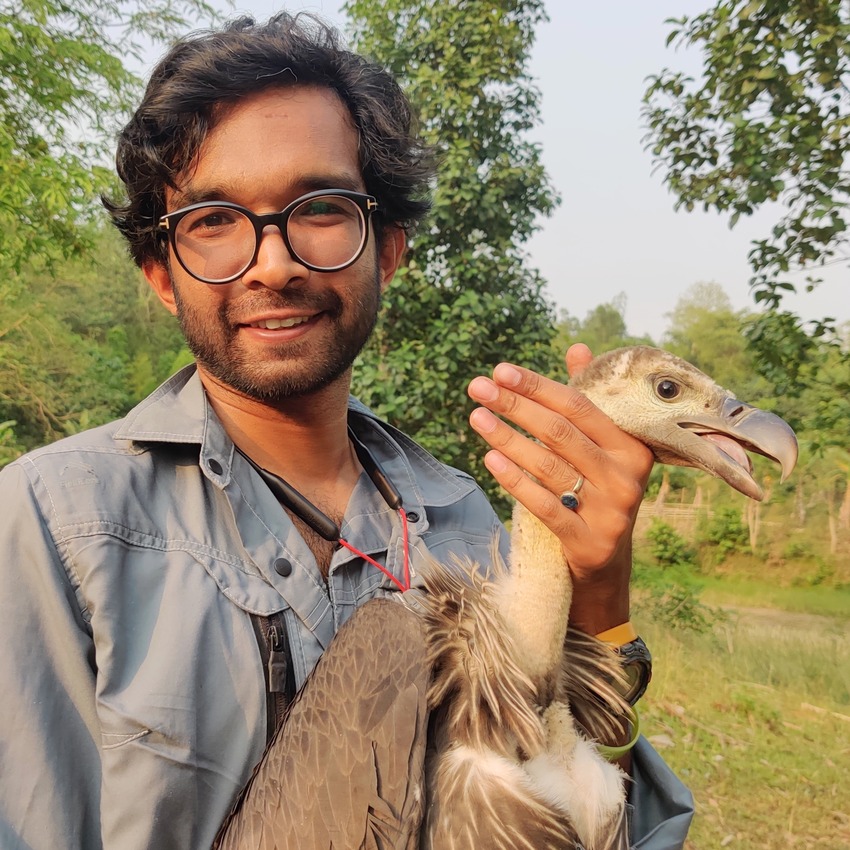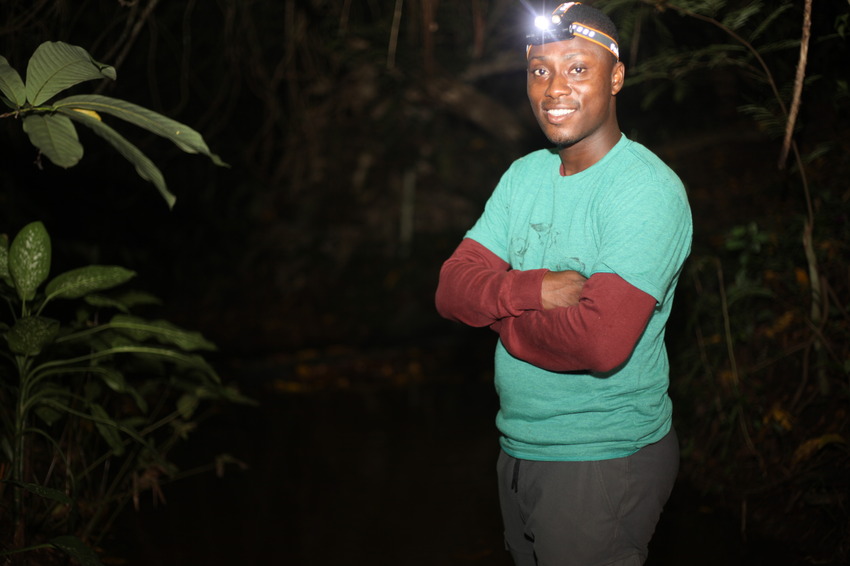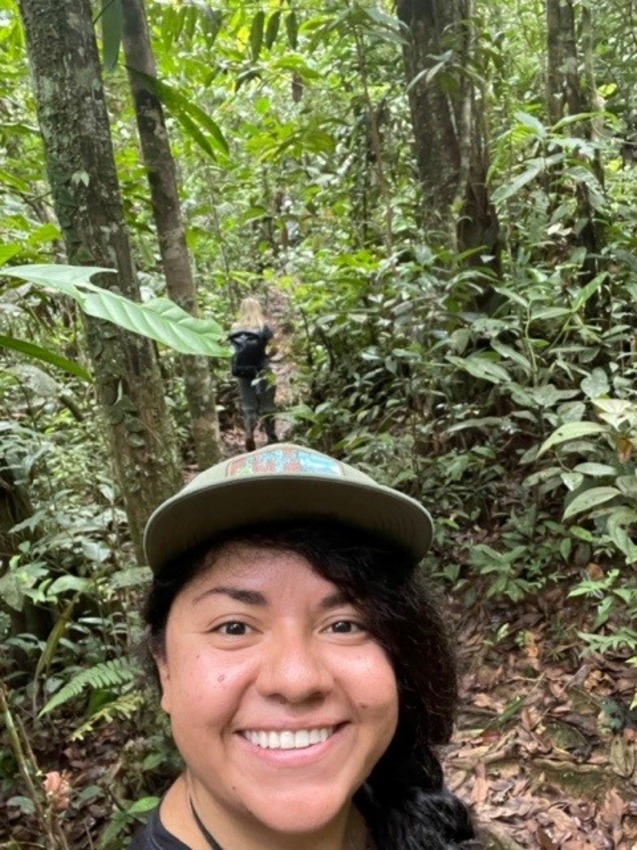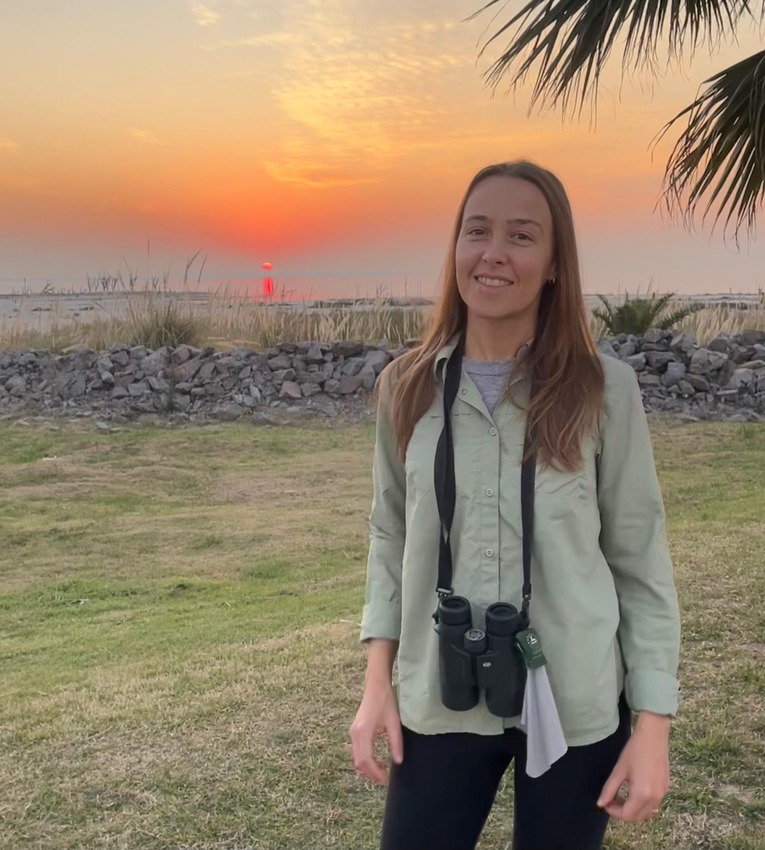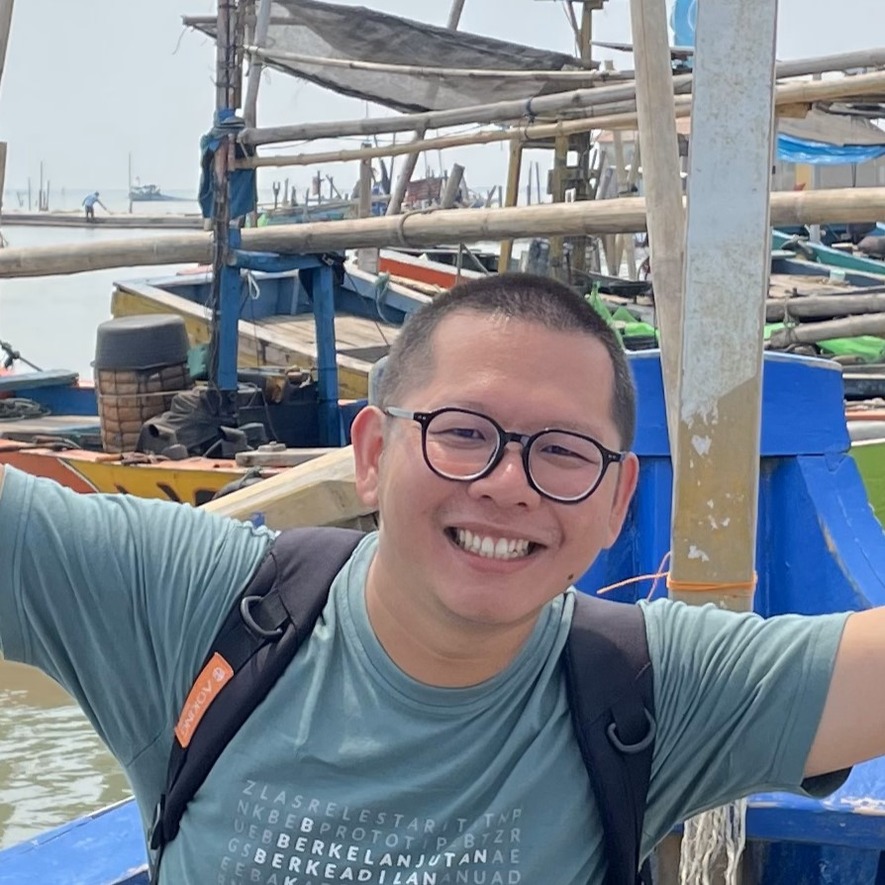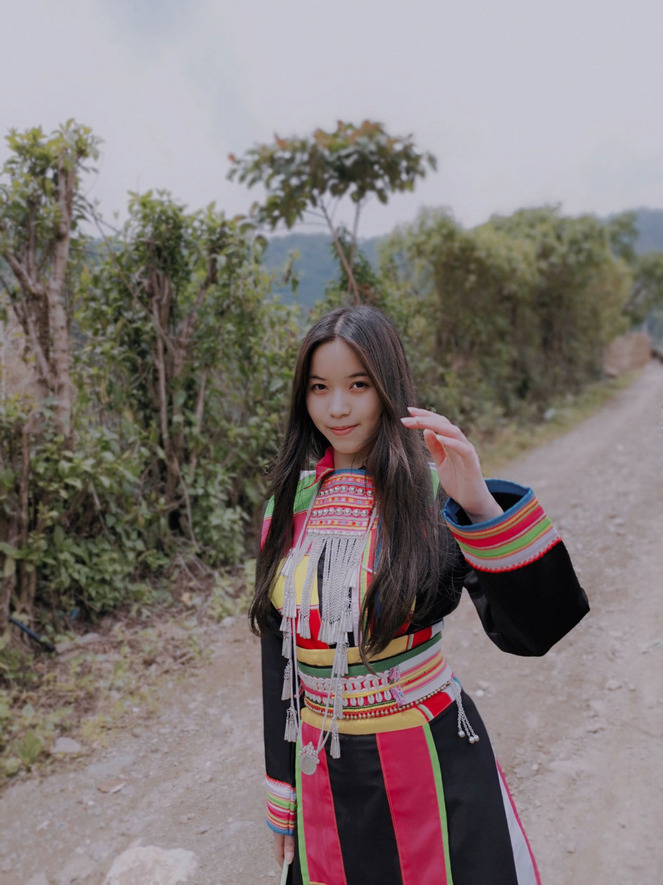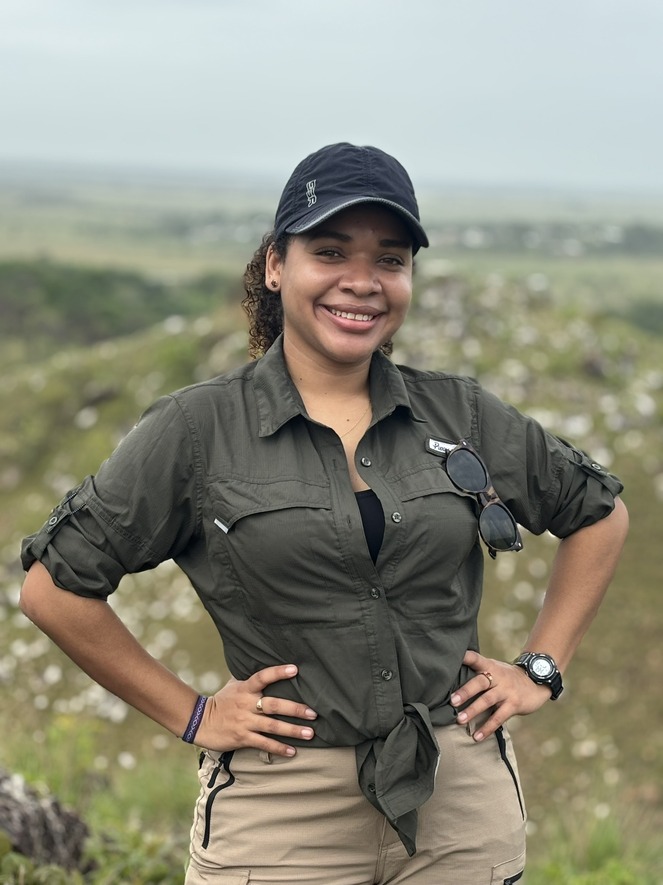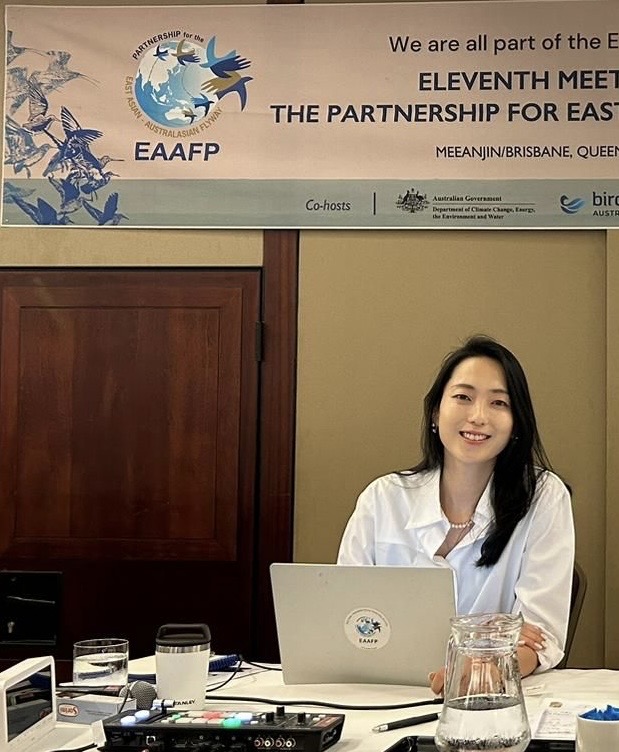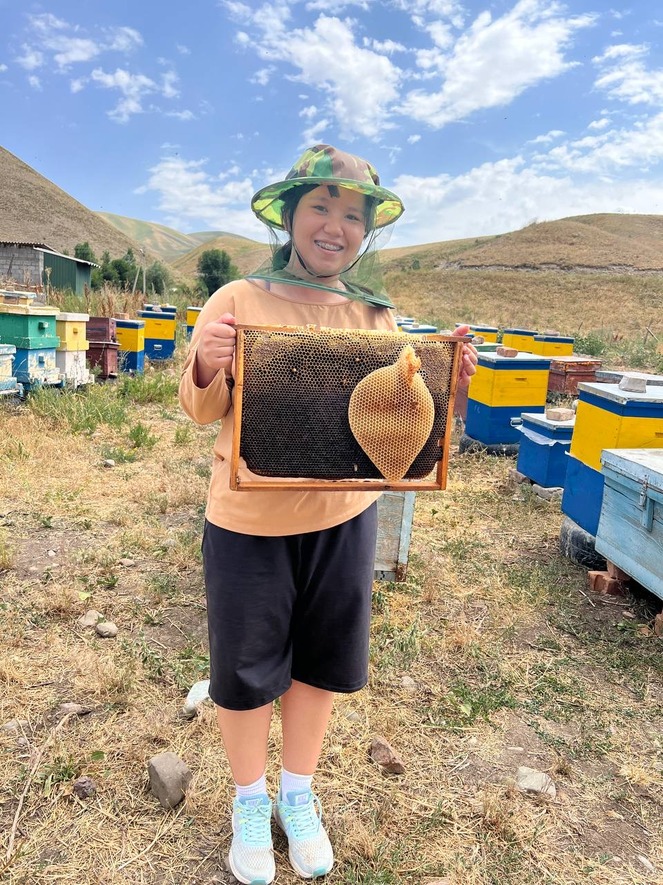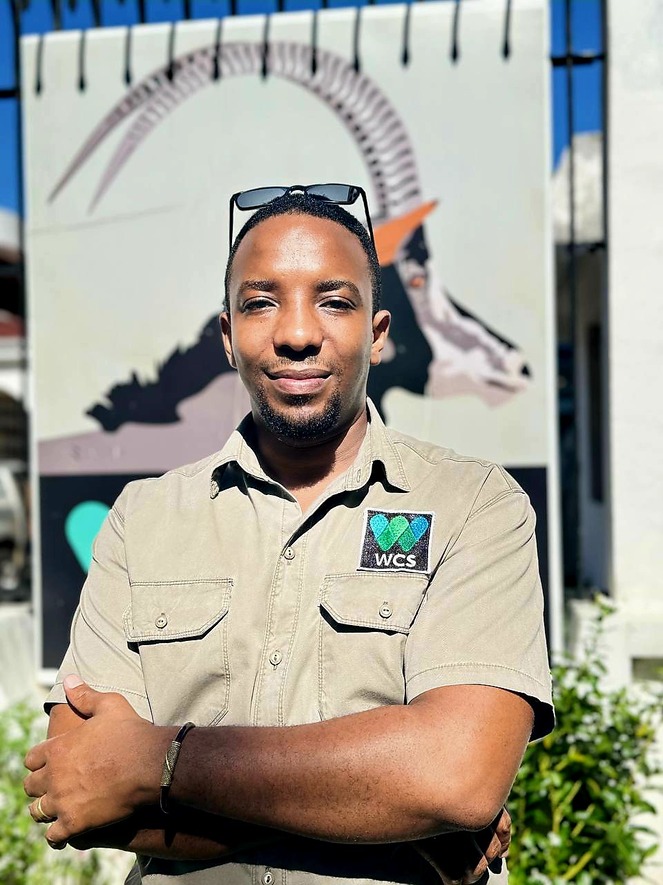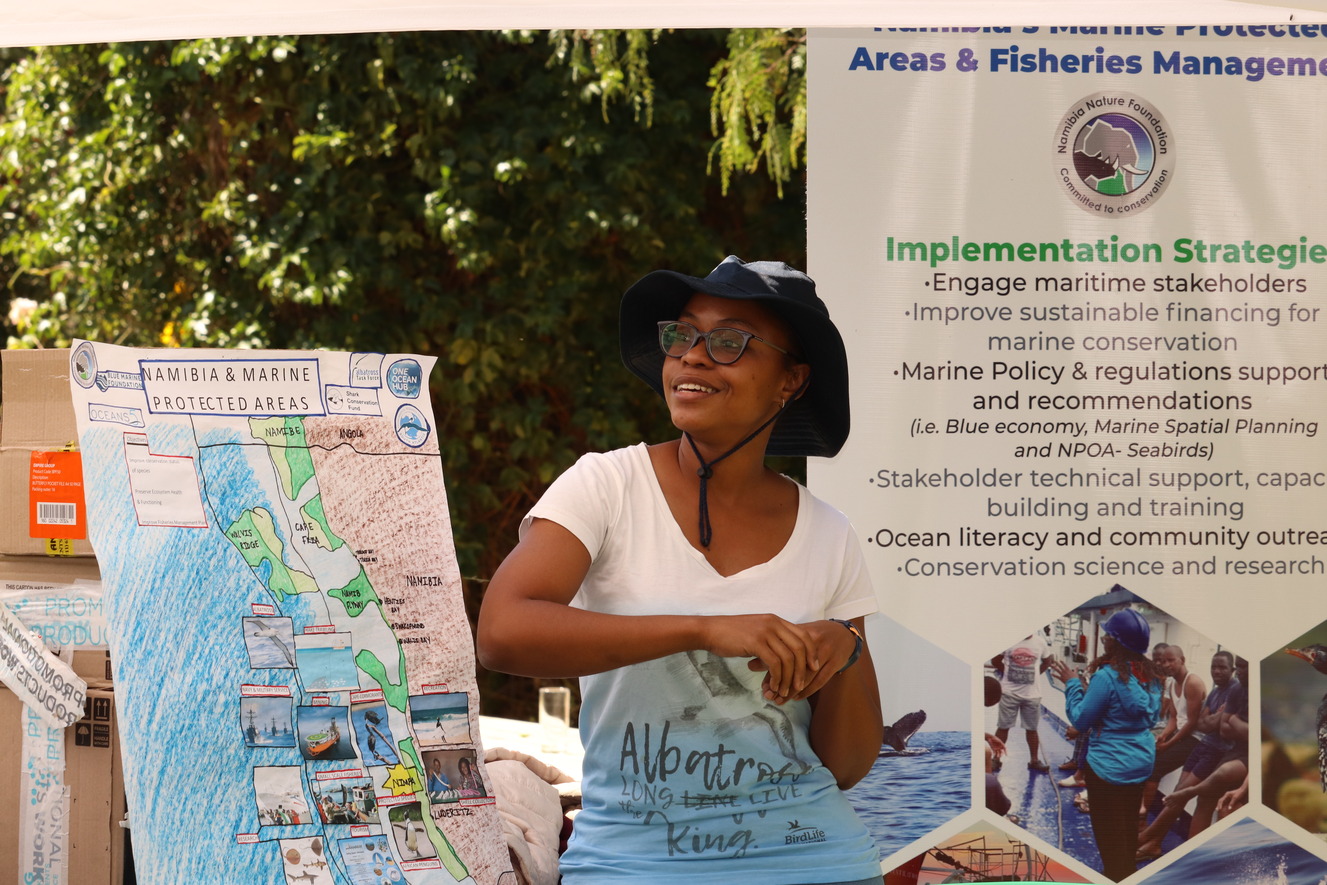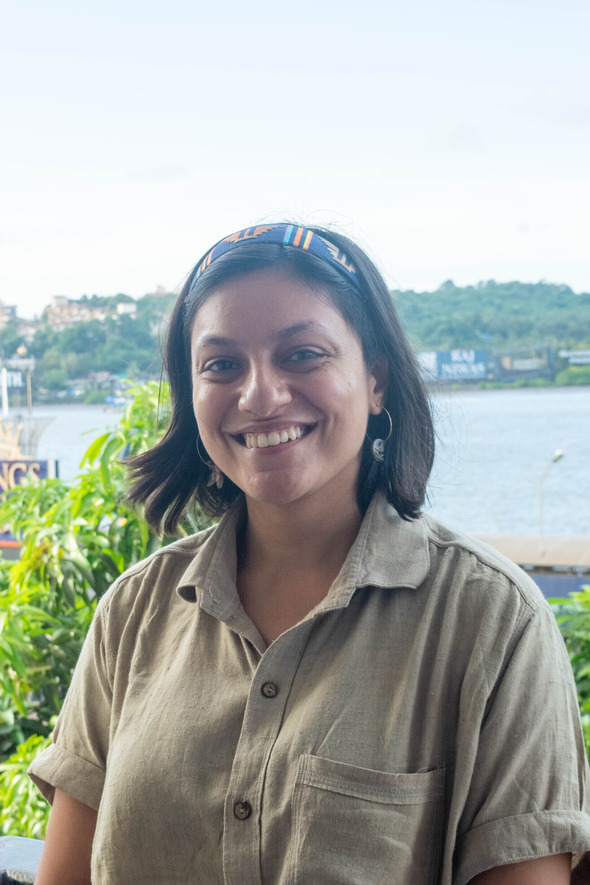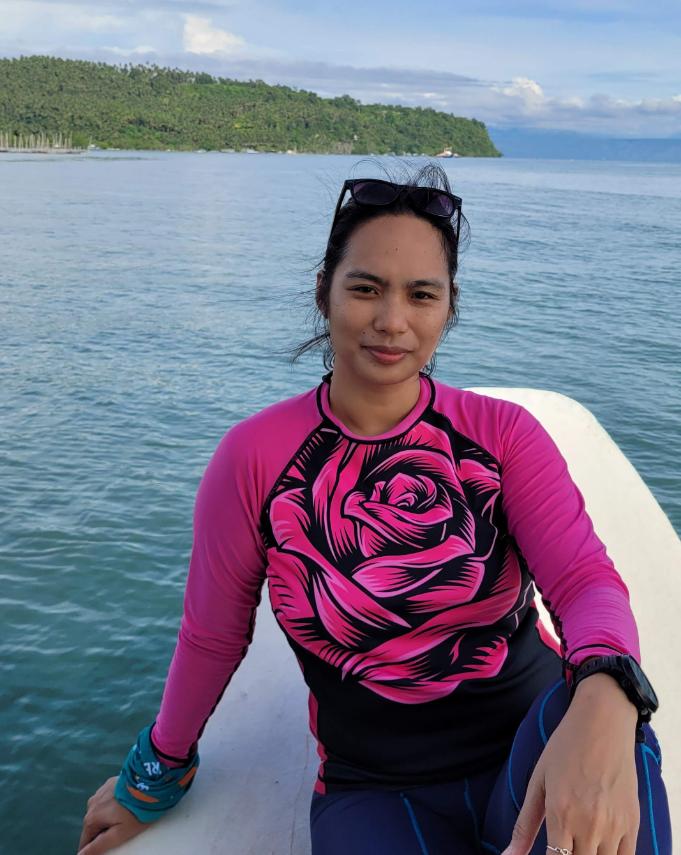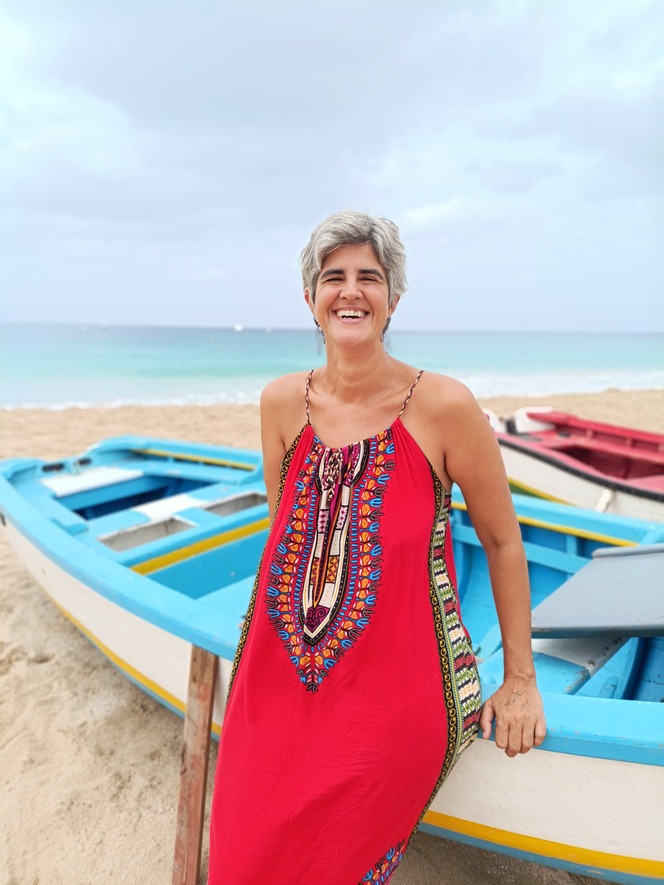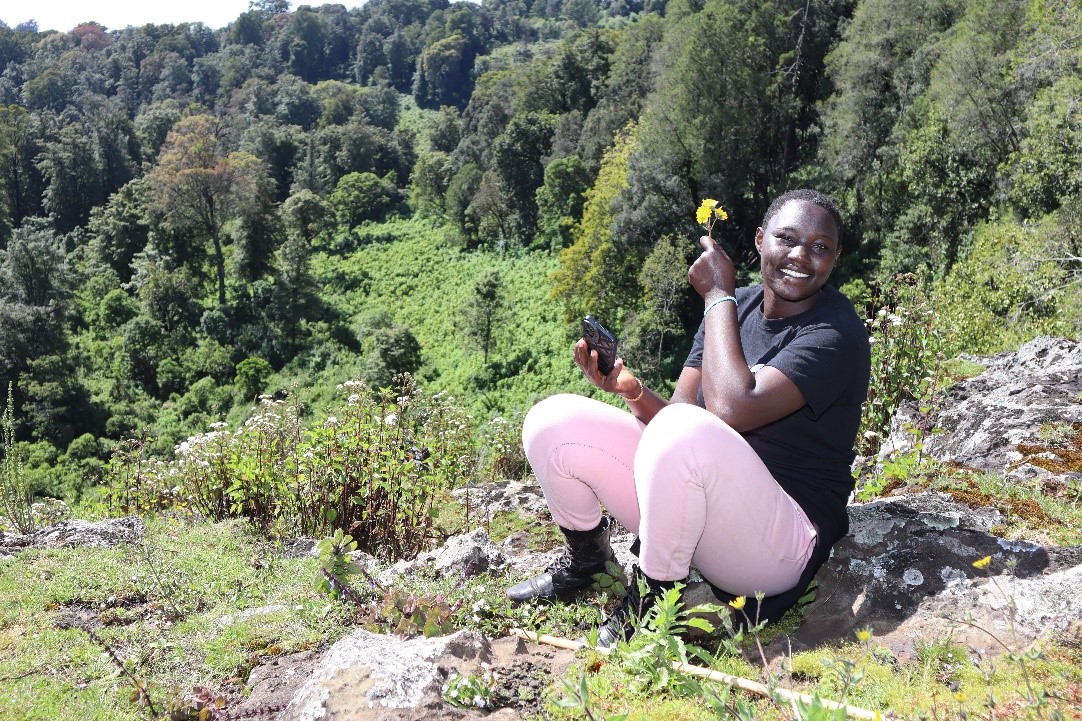The 2024-2025 cohort comprises 16 students from 15 countries.
Rosebell Abwonji, Kenya
As a Kenyan citizen with seven years of experience in business, conservation, and community development, I have dedicated my career to the Maasai Mara ecosystem. My work has spanned both corporate and nonprofit sectors, providing a unique lens on environmental policies and governance. Through fellowships at Global Diversity and UC Berkeley, and a Master's in Business Administration for Conservation Leaders, I have honed my skills in promoting diversity, equity, and inclusion within the conservation sector. I have had the privilege of witnessing first hand the delicate balance between communities and the natural environment. This has involved designing and implementing a youth capacity building program to promote their participation in conservation efforts. I have also championed for diversity and inclusion within the conservation field through strategy formulation and raising awareness in various forums. At Cambridge, I aim to develop strategies for more inclusive global conservation practices. By focusing on the intersection of social justice and environmental stewardship, I hope to ensure that all voices, particularly those of underrepresented communities, are central to our efforts to protect natural resources. I am particularly interested in the potential of community-based conservation models and the role of youth engagement in driving sustainable change.
Sakib Ahmed, Bangladesh
An unforgettable encounter with a Bengal tiger in the Sundarbans during my teenage years ignited my passion for conservation. Looking into those bright burning eyes of the tiger inspired me to dedicate my life for the protection of the amazing species and habitats of Bangladesh. This led to an undergraduate degree in Environmental Science and a decade-long engagement with the International Union for Conservation of Nature (IUCN). At IUCN, I played pivotal roles in conserving some of world’s most threatened wildlife, including white-rumped vultures, spoon-billed sandpipers, and gharials. In my role at IUCN, I secured the vulture conservation initiative, where I led scientific research on vultures, implemented community-based efforts, and collaborated with government stakeholders to create a nexus leading to pro-conservation policies. I co-developed and implemented the Bangladesh Vulture Conservation Action Plan. A notable achievement in my career was advocating for and securing the historic ban on the vulture-toxic drug ketoprofen in Bangladesh. In addition to my love for fieldwork, I have published peer-reviewed papers and books, contributing to developing conservation frameworks and policies, and the IUCN Red List for threatened species for Bangladesh. I’m an avid birdwatcher and wildlife photographer with keen interests in travel and writing.
Michael Akrasi, Ghana
Since childhood, my fascination with nature has evolved into a commitment to wildlife conservation, inspired by the alarming amphibian extinction rate. I hold an MPhil in Wildlife and Range Management and a BSc in Natural Resources Management from Kwame Nkrumah University of Science and Technology, Ghana. With over seven years of experience in field research and community awareness, I specialise in GIS and Remote Sensing and have a deep passion for wildlife photography. My journey in conservation began at the Herp Conservation Ghana, where I served as the Senior Conservation Officer. In this role, I led capacity-building workshops, habitat restoration programs, and conservation outreach initiatives. I played a pivotal role in establishing a protected area for the Critically Endangered Togo slippery frog and other threatened amphibians by fostering strong partnerships with local communities. Currently, I lead Wild Ghana, a wildlife photography movement. I aim to blend amphibian conservation with photography to raise awareness and establish a nature photography non-profit organisation. Through this MPhil in Conservation Leadership, I seek to gain essential skills for impactful conservation work, integrating hands-on experience and internship opportunities into my career goals.
Maritza Arizaga Prado, Mexico/US
As a first-generation immigrant with Mexican heritage in the U.S., I am deeply involved in servant leadership, empowering disenfranchised communities impacted by social-ecological injustices. Through those experiences, I found a sense of belonging in nature, driving my passion for conservation and leading to a degree in sustainability from Colorado State University, which validated the interconnectedness of people, the environment, and the economy. I continued with a career in community-led conservation and facilitation at The Nature Conservancy (TNC), where I collaborated with practitioners across the globe using systems-thinking methodologies to develop community-led conservation practices centered on the leadership of Indigenous Peoples and Local Communities. I've also worked in municipal government, creating equitable public outreach and participatory processes to engage all stakeholders in ongoing services to improve indoor and outdoor air quality, climate action planning, and increase recycling and waste diversion. In my recent role at Western Resource Advocates, I coached and advised policy experts and policy coalitions across seven states on equitable conservation and environmental justice principles. As an interdisciplinary professional, I'm eager to learn new skills from the MPhil in Conservation Leadership to enhance my leadership aptitude and augment my expertise in transformational change so that people and nature can thrive together.
Marcela Castellino, Argentina
I was born and raised in Miramar, Argentina, a small town on the shore of Laguna Mar Chiquita, the largest saline lake in South America. Growing up there sparked my curiosity about nature, biological processes, and natural cycles. Toward the end of my Biology degree at the National University of Córdoba, I had the opportunity to travel to the Great Salt Lake (Utah, USA) to research Wilson’s phalarope, a migratory shorebird dependent on salt lakes across the Americas. This marked the beginning of my career focused on shorebirds and salt lakes, which continues to this day. Back in Argentina, I continued researching shorebird ecology and habitat use in the Argentine pampas. After five years, I realized I wanted to work towards the sustainable conservation of the species and sites I studied. Since 2019, I have been part of Manomet’s Flyways Team and the Western Hemisphere Shorebird Reserve Network (WHSRN), collaborating with partners across the hemisphere to successfully design and implement shorebird conservation projects. This role involves facilitating dialogue, reaching agreements, and coordinating efforts among multiple partners. I am excited to undertake the MPhil in Conservation Leadership to gain the tools and skills essential for effective conservation. I’m confident that this experience will help me have a greater positive impact on both people and the planet.
Eko Chalim, Indonesia
Over the past decade, I transitioned my career from accounting to become a passionate marine conservation and sustainable fisheries practitioner. My journey into this field began with my love for the ocean, sparked by my hobby-turned-profession as a scuba diver. For the past five years, I have served as the Director of Sahabat Laut Lestari (SLL Fisheries), an Indonesian-based social enterprise. In this role, I oversee operations focused on implementing sustainable fisheries practices that balance ecological, social, and economic priorities with a touch of technology implementation. I am deeply committed to addressing the inequities faced by coastal and fisheries communities, advocating for social and economic justice within the framework of sustainable fisheries management. My work emphasises inclusive practices that empower these communities, ensuring they are active participants and beneficiaries of sustainable initiatives. Currently, I am also becoming a Senior Fellow at the Atlantic Fellows for Social and Economic Equity (AFSEE), based at the International Inequalities Institute at the London School of Economics and Political Science.
Jingyu Chen, China
I graduated from the Institute of Anthropology at National Tsing Hua University. I am currently conducting research on community-based conservation of the skywalker hoolock gibbon (Hoolock tianxing) in Lisu communities in Yingjiang County, China, near the Sino-Myanmar border. Since 2018, I have been working as a project manager for Cloud Mountain Conservation, a grassroots NGO, where I focus on the conservation of skywalker gibbons and other non-human primates. My research, which is practice-oriented and grounded in social anthropology, offers a broader understanding of Lisu livelihoods and gibbon conservation in contemporary China. I advocate for integrating anthropological methodologies into interdisciplinary conservation research, emphasizing the social-ecological relationships of local communities. This includes empowering local women and children's groups to challenge the traditional top-down, male-dominated conservation approaches in China. Through this interdisciplinary practice, I aim to develop a localized framework for community-based conservation within the Chinese cultural and political context.
Felicia Collins, Guyana
As a descendant of the Lokono People and having grown up in the Barima-Waini Region, living in harmony with nature is deeply rooted in my culture and identity. My undergraduate studies in Marine and Environmental Biology allowed me to understand the natural world from a scientific and molecular perspective. In 2020 I worked with the Guyana Marine Conservation Society as the Project Coordinator for the Barima-Mora Passage Mammals Survey. Two years later, I published ’Mammals of the Barima-Mora Passage’, a book aimed at increasing environmental education and awareness for students from local and Indigenous communities. For the past three years, I have worked at the Protected Areas Commission, co-managing the Shell Beach Protected Area - Guyana’s only coastal protected area - where I led the implementation of the annual sea turtle conservation programme and facilitated community engagement activities for 23 surrounding Indigenous communities. Currently, I serve as the Technical Officer for the Amazon Sustainable Landscapes (ASL) Project, executed by the Environmental Protection Agency. My current goal is to delve into the social science aspects of conservation through my postgraduate studies in Conservation Leadership, as I recognise the important role of empowering local and Indigenous communities to drive meaningful conservation efforts.
Hyeseon Do, Republic of Korea
I am an environmental advocate whose journey began as an introverted child with a deep passion for diplomacy and conservation. My leadership in biodiversity was forged through my role with the East Asia-Australasian Flyway Partnership (EAAFP), where I played a pivotal role in securing UNESCO World Natural Heritage sites for the Korean and Chinese Tidal Flats, essential for 50 million migratory waterbirds and local livelihoods. Coordinating with 41 partners, including governments, major environmental organizations, and local NGOs, reinforced the power of collective action in addressing biodiversity and climate crises. My legal background has also strengthened my leadership and negotiation skills, enabling me to facilitate high-profile meetings and COPs. Now pursuing an MPhil in Conservation Leadership at Cambridge, I aim to develop innovative strategies and lead international collaborations to address urgent environmental challenges. Recently witnessing climate change devastate the homes of innocent young girls has deepened my further commitment to connecting climate action with biodiversity conservation and Indigenous peoples’ engagement, particularly where these links are often overlooked.
Benazir Kabaeva, Kyrgyzstan
I have been working as a project assistant at the Snow Leopard Foundation in Kyrgyzstan for the last 5 years. I have led multiple community based programs such as beekeeping, fruit plantations, ecotourism, drying of fruits and vegetables and livestock vaccination. These programs have been developed to improve resilience and tolerance of local communities towards snow leopards. I have also worked with the governmental agencies and parliament to improve the environment policy which resulted in development and approval of the rules on ecotourism in protected areas of Kyrgyzstan. In addition to working with the local communities and national government, I have been involved in the Global Snow Leopard and Ecosystem Protection program that brings together 12 snow leopard range countries by organizing the annual Steering Committee Meeting. One day I am at herder’s yurt drinking mare’s fermented milk, another day I am at honey extraction, and then in a room with Ministers of Ecology from all 12 range countries discussing resolutions on snow leopard conservation. I am passionate about snow leopard conservation because I have an opportunity to help people while conserving such a charismatic cat. I am looking forward to becoming a better advocate for nature conservation.
Michael Lesecha, Tanzania
I am a passionate wildlife conservationist working for the Wildlife Conservation Society (WCS) in Tanzania. My responsibilities include securing and managing grants/resources; managing human resources; supervising and at times leading conservation protection activities, research, and monitoring, infrastructure development; fleet and mobility management; community engagement programs; and mainly acting as a key liaison to the government, conservation authorities and other stakeholders. Prior to WCS, I worked with the government’s Tanzania Wildlife Management Authority (TAWA) in Rukwa-Lwafi Game Reserve and was later promoted to work at TAWA headquarters as a protection data analyst and assisted other protection operations; problematic animal control; conservation research and community outreach; reserved areas management and infrastructure development programs under the Directorate of Conservation Services across 28 TAWA managed areas. My current position and expertise render me pivotal in aligning conservation efforts in Tanzania with different organizational commitments. The inadequate understanding and addressing of agro-pastoral dynamics as a main driver of human-wildlife conflicts is currently my major interest. I hope to gain important leadership and coordination skills from this MPhil to effectively work and coordinate with multiple sectors and disciplines in addressing this issue in the country and elsewhere. I hold a Bachelor of Science in Wildlife Management.
Samantha Matjila, Namibia/South Africa
Despite hailing from Gobabis, a small landlocked town that prides itself on its cattle farming, I happen to be a marine conservationist deeply captivated by the mysteries of the ocean. My academic journey, marked by an MSc in Agriculture (Aquaculture) from Stellenbosch University and a BSc in Fisheries & Aquatic Science from the University of Namibia, laid the groundwork for my career in marine conservation. Despite not growing up near the ocean, my experiences on the Atlantic, guided by seasoned fishermen, have instilled in me a profound respect for marine ecosystems. With over seven years of experience, I have made significant contributions to marine conservation through my tenure at Namibia’s leading NGO, the Namibia Nature Foundation. As a Marine Programme Coordinator and Albatross Task Force Project Coordinator, I have spearheaded initiatives in coastal conservation, species protection, and the Blue Economy. Co-authoring a paper on reducing seabird mortality in Namibia’s commercial hake fisheries remains a career highlight, reflecting my commitment to sustainable practices. My current focus is on integrating conservation strategies between terrestrial and marine spaces, addressing the bias towards terrestrial conservation. I collaborate with the Namibian government on Marine Protected Areas management plans, policy reviews, and community support. I find fulfillment in outdoor activities, the performing arts, and creative pursuits, which inspire my professional endeavors and keep me connected to the memory of my late daughter, Kandali Didintle Eveline Kambonde, my guiding light on this journey.
Nandini Mehrotra, India
I spent my early childhood between the open ocean, the Himalayas and schooling in New Delhi. Vastly different, each of these inculcated a curiosity and love for nature which turned into action by middle school. Since then I have been on a journey to explore and conserve the beautiful ecology our planet has to offer. In training, I've completed my Master's in Environmental Policy from Cornell University and am also a Kinship Fellow (2022). For the last five years, I worked at an organisation where we used technology – a combination of spatial intelligence, computer vision and robotics – to amplify conservation impact in the Indian wildlife conservation ecosystem. I had the opportunity to work on landscapes and species across the country and my role evolved from a researcher to program manager and finally ended as leading operations. I had the chance to witness the lifecycle of the organisation as its first employee as well as winding down operations. Currently, I am curious to better understand how we view conservation impact and to refine how I could meaningfully contribute to it. I see this course as the next step in this journey.
Candeze Mongaya, Philippines
I’m a marine conservationist from the heart of the Coral Triangle, with over a decade of experience in marine conservation, policy advocacy, and community engagement. My professional journey began in environmental journalism, where I developed a deep understanding for pressing environmental issues in my country. I transitioned to conservation work, leading programs that integrate science, policy, and community needs. I’m currently a Senior Policy Manager for the global hub at Rare, a conservation organization that uses a behavior-centered approach to strengthen community-led coastal fisheries management and restore marine ecosystems. I’ve worked with community leaders and partners in Asia and the Pacific, South America, and South Africa, among others, on strategic alignment and implementation of community-led marine conservation programs. I also support policy initiatives and foster cross-team collaboration to enhance policy and governance implementation. My passion for conservation is deeply rooted in my coastal upbringing, where I have witnessed first hand the challenges facing marine ecosystems. This drives my commitment to developing equitable and science-driven policies to protect marine biodiversity. I’m eager to advance my expertise through the MPhil in Conservation Leadership at Cambridge, where I aim to sharpen my skills and drive meaningful change at the intersection of policy, community, and environmental sustainability.
Rocio Moreno Carrillo, Spain/Cape Verde
After thirteen years in marine research, I transitioned from academia to conservation, driven by a passion for preserving ecosystems. My postdoctoral work with the British Antarctic Survey, Birdlife and RSPB highlighted the power of collaborative conservation efforts, strengthening my commitment to the field. Following these pivotal chapters, I decided to focus on the Global South through an NGO supporting marginalized children and women in Nepal. For four years, I immersed myself in a transformative experience working on education, health, and livelihood initiatives, gaining a deep understanding of the importance of community inclusion in preserving biodiversity. I then redirected my career toward Africa and became the director of Fundação Maio Biodiversidade, a community-based conservation NGO in Cabo Verde. For the last six years, I led strategic initiatives, secured funding, and collaborated with local communities, governments, and stakeholders. Major achievements included the parliamentary approval of the Maio Protected Area Complex Management Plan and the designation of Maio as a UNESCO Biosphere Reserve. My future aim is to tackle complex conservation challenges in biodiversity hotspots by drawing on my experience in academia, NGOs, and leadership. I plan to contribute globally by developing inclusive, community-driven conservation strategies that empower marginalized groups and create lasting environmental and social impacts in vulnerable regions.
Phoebe Ndiema, Kenya
Coming from a Forest dwelling Indigenous community, interaction with nature is our daily business. Our livelihood entirely depends on nature. We gather food, we keep livestock and our mothers make baskets out of bamboos; sell them and in turn empower themselves economically. We sell honey harvested from the natural forest. Despite the forest being our ancestral home, we’ve faced numerous evictions in the name of ‘conservation’ which is a narrative that is misleading. If my community were destructors of the ecosystem why then is it intact? This is the question that drove me into pursuing the field of conservation as a career. I want to understand conservation policies and evalutate if indeed they are about human rights violations through eviction in the name of ‘Conservation’. My passion for raising awareness about the harmonious coexistence between Indigenous people and nature, along with my commitment to demonstrating stewardship for my community and other Indigenous groups living in the forest, were among the key reasons I sought the opportunity to pursue the MPhil in Conservation Leadership. I believe with this course, I will be equipped with leadership skills to collaborate with policy makers and demonstrate to them that Indigenous people are not a threat to biodiversity. Before coming to Cambridge, I worked as the Gender Justice and Mapping officer in a community-led organization called CIPDP (www.chepkitale.org). I developed capacity for women and youth in land rights and conservation focusing on Ogiek people of Mt. Elgon. I also led a consortium of mapping projects which saw my community advance our land rights and conservation efforts. More recently, I was a Biodiversity Fellow at the University of Oxford.

